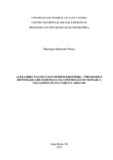| dc.creator | Pause, Henrique Hamester | |
| dc.date.accessioned | 2021-12-14T17:11:29Z | |
| dc.date.available | 2021-12-14T17:11:29Z | |
| dc.date.issued | 2021-08-26 | |
| dc.identifier.uri | http://repositorio.ufsm.br/handle/1/23301 | |
| dc.description.abstract | The objective of our research is to present some considerations about how the figure of Alexander the Great was perceived and reframed by the Roman writers Plutarch of Chaeroneia and Arrian of Nicomedia, during the 1st and 2nd centuries AD, focusing on the elements of gender/virility intersecting with the Greco-Roman cultural identity of the ruling elites. We will focus, especially, on the analysis of the works of these two authors that deal with the figure of Alexander, which are Book IV of Parallel Lives and On Fortune or Virtue by Alexander the Great, by Plutarch and The Anabasis of Alexander, by Arrian. We will seek, thus, to understand how the figure of Alexander, in these works, was described as an example by the authors to be studied in front of the Roman princes Trajan (98 - 117) and Hadrian (117 - 138), determining what they should or should not do when being a ruler in terms of virility and identity customs. We take the idea that Plutarch and Arrian have showed that everything Alexander achieved, his immense empire and his victories, he owed to his humanitas, acquired through education (παιδεία – paideia), moderation (gravitas/Σωφροσύνη – sôphrosýnê) and self-control (ἐγκράτεια – enkráteia). | eng |
| dc.description.sponsorship | Coordenação de Aperfeiçoamento de Pessoal de Nível Superior - CAPES | por |
| dc.language | por | por |
| dc.publisher | Universidade Federal de Santa Maria | por |
| dc.rights | Attribution-NonCommercial-NoDerivatives 4.0 International | * |
| dc.rights.uri | http://creativecommons.org/licenses/by-nc-nd/4.0/ | * |
| dc.subject | Alexandre Magno | por |
| dc.subject | Identidade cultural | por |
| dc.subject | Virilidade | por |
| dc.subject | Plutarco | por |
| dc.subject | Arriano | por |
| dc.subject | Alexander the Great | eng |
| dc.subject | Cultural identity | eng |
| dc.subject | Virility | eng |
| dc.subject | Plutarch | eng |
| dc.subject | Arrian | eng |
| dc.title | Alexandre Magno como homem-fronteira: virilidade e identidade greco-romana na construção do monarca macedônio de Plutarco e Arriano | por |
| dc.title.alternative | Alexander Magnus as the frontier man: greco-roman identity and virility in the construction of the macedonian monarch from Plutarch and Arrian | eng |
| dc.type | Dissertação | por |
| dc.description.resumo | O objetivo de nossa pesquisa é apresentar algumas considerações sobre como a figura de Alexandre Magno ou Alexandre, o Grande, foi percebida e ressignificada pelos escritores romanos Plutarco de Queroneia e Arriano de Nicomédia, nos séculos I e II d.C., enfocando nos elementos de gênero/virilidade interseccionados à identidade cultural greco-romana das elites governantes. Centrar-nos-emos, especialmente, na análise das obras destes dois autores que tratam da figura de Alexandre, sendo elas o Livro IV de Vidas Paralelas e Sobre a Fortuna ou Virtude de Alexandre Magno, de Plutarco e a Anábase de Alexandre Magno, de Arriano. Buscaremos, então, entender como a figura de Alexandre, nessas obras, foi descrita enquanto figura de exemplo frente aos princepes romanos Trajano (98 – 117) e Adriano (117 – 138), servindo ao que devia ou não ser feito pelos governantes em termos de virilidade e costumes identitários. Partimos da ideia de que Plutarco e Arriano mostraram que tudo o que Alexandre conseguiu, seu imenso império e suas vitórias, devia à sua humanitas, adquirida pela educação (παιδεία – paideia), à sua moderação (gravitas/Σωφροσύνη – sôphrosýnê) e a seu autocontrole (ἐγκράτεια – enkráteia). | por |
| dc.contributor.advisor1 | Silva, Semíramis Corsi | |
| dc.contributor.advisor1Lattes | http://lattes.cnpq.br/9330942433476742 | por |
| dc.contributor.referee1 | Rossi, Andrea Lúcia Dorini de Oliveira Carvalho | |
| dc.contributor.referee2 | Cerqueira, Fábio Vergara | |
| dc.creator.Lattes | http://lattes.cnpq.br/5453445443698422 | por |
| dc.publisher.country | Brasil | por |
| dc.publisher.department | História | por |
| dc.publisher.initials | UFSM | por |
| dc.publisher.program | Programa de Pós-Graduação em História | por |
| dc.subject.cnpq | CNPQ::CIENCIAS HUMANAS::HISTORIA | por |
| dc.publisher.unidade | Centro de Ciências Sociais e Humanas | por |



